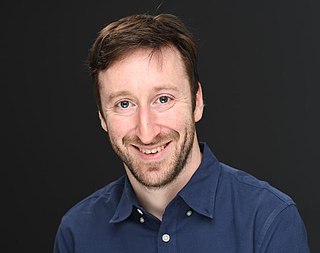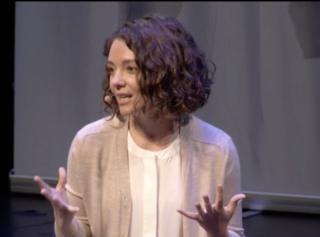
The Bill & Melinda Gates Foundation (BMGF), a merging of the William H. Gates Foundation and the Gates Learning Foundation, is an American private foundation founded by Bill Gates and Melinda French Gates. Based in Seattle, Washington, it was launched in 2000 and is reported to be the second largest charitable foundation in the world, holding $69 billion in assets as of 2020. On his 43rd birthday, Bill Gates gave the foundation $1 billion. The primary stated goals of the foundation are to enhance healthcare and reduce extreme poverty across the world, and to expand educational opportunities and access to information technology in the U.S. Key individuals of the foundation include Bill Gates, Melinda French Gates, Warren Buffett, chief executive officer Mark Suzman, and Michael Larson.
The William and Flora Hewlett Foundation, commonly known as the Hewlett Foundation, is a private foundation, established by Hewlett-Packard cofounder William Redington Hewlett and his wife Flora Lamson Hewlett in 1966. The Hewlett Foundation awards grants to a variety of liberal and progressive causes.

The Atlantic Philanthropies (AP) was a private foundation created in 1982 by American businessman Chuck Feeney. The Atlantic Philanthropies focused its giving on health, social, and politically left-leaning public policy causes in Australia, Bermuda, Ireland, South Africa, the United States and Vietnam. It was among the largest foreign charitable donors in each of the countries in which it operated, and was the single largest funder of programs that encouraged the civic engagement of older people and of comprehensive immigration reform in the United States. With the single largest advocacy grant ever made by a foundation, the Atlantic Philanthropies committed $27 million to win passage of the Affordable Care Act in the United States. About half of the Atlantic Philanthropies' grants were made in donations that allow lobbying.

Charity is the voluntary provision of assistance to those in need. It serves as a humanitarian act, and is unmotivated by self-interest. Various philosophies about charity exist, with frequent associations with religion.
The Johns Hopkins Center for Health Security is an independent, nonprofit organization of the Johns Hopkins Bloomberg School of Public Health. The center works to protect people's health from epidemics and pandemics and ensures that communities are resilient to major challenges. The center is also concerned with biological weapons and the biosecurity implications of emerging biotechnology.
GiveWell is an American non-profit charity assessment and effective altruism-focused organization. GiveWell focuses primarily on the cost-effectiveness of the organizations that it evaluates, rather than traditional metrics such as the percentage of the organization's budget that is spent on overhead.

Dustin Aaron Moskovitz is an American billionaire internet entrepreneur who co-founded Facebook, Inc. with Mark Zuckerberg, Eduardo Saverin, Andrew McCollum and Chris Hughes. In 2008, he left Facebook to co-found Asana with Justin Rosenstein. In March 2011, Forbes reported Moskovitz to be the youngest self-made billionaire in the world, on the basis of his then 2.34% share in Facebook. As of October 2023, his net worth is estimated at US$18.0 billion by the Bloomberg Billionaires Index.

MacKenzie Scott is an American novelist and philanthropist. As of January 2024, she has a net worth of US$40.6 billion, owning a 4% stake in Amazon, the company her then-husband, Jeff Bezos, founded. As such, Scott is the third-wealthiest woman in the United States and the 47th-wealthiest individual in the world. Scott was named the world's most powerful woman by Forbes in 2021 and one of Time's 100 most influential people in 2020.

The Life You Can Save: Acting Now to End World Poverty is a 2009 book by Australian philosopher Peter Singer, in which the author argues that citizens of affluent nations are behaving immorally if they do not act to end the poverty they know to exist in developing nations.

Holden Karnofsky is an American nonprofit executive. He is a co-founder and Director of AI Strategy of the research and grantmaking organization Open Philanthropy. Karnofsky co-founded the charity evaluator GiveWell with Elie Hassenfeld in 2007 and is vice chair of its board of directors.
GiveDirectly is a nonprofit organization operating in low income areas that helps families living in extreme poverty by making unconditional cash transfers to them via mobile phone. GiveDirectly transfers funds to people in Bahamas, Bangladesh, DRC, Liberia, Kenya, Malawi, Morocco, Mozambique, Nigeria, Rwanda, Togo, Turkey, Uganda, USA, and Yemen.
Good Ventures is a private foundation and philanthropic organization in San Francisco, and the fifth largest foundation in Silicon Valley. It was co-founded by Cari Tuna, a former Wall Street Journal reporter, and her husband Dustin Moskovitz, one of the co-founders of Facebook. Good Ventures adheres to principles of Effective Altruism and aims to spend most or all of its money before Moskovitz and Tuna die. Good Ventures does not have any full-time staff, and instead distributes grants according to recommendations from Open Philanthropy.
Effective altruism (EA) is a 21st-century philosophical and social movement that advocates "using evidence and reason to figure out how to benefit others as much as possible, and taking action on that basis". People who pursue the goals of effective altruism, sometimes called effective altruists, may choose careers based on the amount of good that they expect the career to achieve or donate to charities based on the goal of maximising positive impact. They may work on the prioritization of scientific projects, entrepreneurial ventures, and policy initiatives estimated to save the most lives or reduce the most suffering.

80,000 Hours is a London-based nonprofit organisation that conducts research on which careers have the largest positive social impact and provides career advice based on that research. It provides this advice on their website and podcast, and through one-on-one advice sessions. The organisation is part of the Centre for Effective Altruism, affiliated with the Oxford Uehiro Centre for Practical Ethics. The organisation's name refers to the typical amount of time someone spends working over a lifetime.
GivingTuesday, often stylized as #GivingTuesday for the purposes of hashtag activism, is the Tuesday after Thanksgiving in the United States. It is touted as a "global generosity movement unleashing the power of people and organizations to transform their communities and the world". An organization of the same name is an independent 501(c)(3) nonprofit that supports the global movement.
Arnold VenturesLLC is focused on evidence-based giving in a wide range of categories including: criminal justice, education, health care, and public finance. The organization was founded by billionaires John D. Arnold and Laura Arnold in 2010.

Founders Pledge is a London-based charitable initiative, where entrepreneurs commit to donate a portion of their personal proceeds to charity when they sell their business. Inspired by effective altruism, the mission of Founders Pledge is to "empower entrepreneurs to do immense good".

The Chan Zuckerberg Initiative (CZI) is an organization established and owned by Facebook founder Mark Zuckerberg and his wife Priscilla Chan with an investment of 99 percent of the couple's wealth from their Facebook shares over their lifetime. The CZI is set up as a limited liability company (LLC) and is an example of philanthrocapitalism. CZI has been deemed likely to be "one of the most well-funded Philanthropies in human history". Chan and Zuckerberg announced its creation on 1 December 2015, to coincide with the birth of their first child. Priscilla Chan has said that her background as a child of immigrant refugees and experience as a teacher and pediatrician for vulnerable children influences how she approaches the philanthropy's work in science, education, immigration reform, housing, criminal justice, and other local issues.

Cari Tuna is an American nonprofit businessperson. Formerly a reporter for The Wall Street Journal, she co-founded and works for the organizations Open Philanthropy and Good Ventures.

Evidence Action is an American non-profit organization founded in 2013 that scales cost-effective development interventions with rigorous evidence supporting their efficacy. The organization operates four main programs: the Deworm the World Initiative, Safe Water Now, Equal Vitamin Access, and Syphilis-Free Start. It also operates an Accelerator program, whereby new development interventions are screened and scaled according to efficacy. Vox Media has described Evidence Action as taking a "VC approach to development work".














